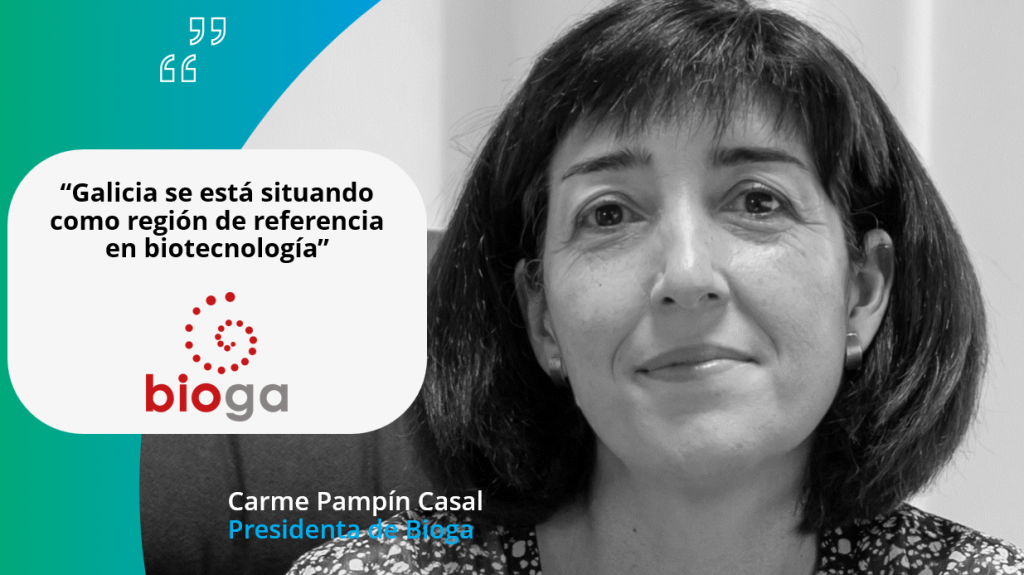“Galicia is positioning itself as a reference region in biotechnology”
If the DATAlifeDigital Innovation Hub is proud of anything, it is to have entities such as Bioga among its associates. With twelve years of work behind it,Cluster this Business Technology Cluster of Life Sciences is constantly working to improve the positioning of the Galician biotechnology sector. What is your goal? Configure an environment with a powerful research system, an active knowledge transfer and a business fabric that makes up the economic engine of Galicia and contributes to the welfare of society.
We had the pleasure of speaking with Carme Pampín, president of Bioga. PhD in Organic Chemistry, she co-founded GalChimia, company that was born from an idea that emerged during her years as a student, of which she is the current CEO. And if something is clear is that, thanks to the fruit of the collaborative and synergistic work of the ecosystem of the sector, Galicia is positioning itself as a reference region in biotechnology.
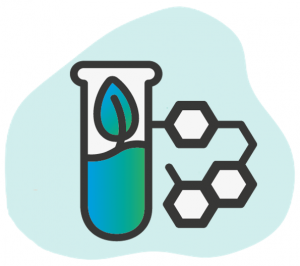
What is the role of a cluster like Bioga in the value chain?
Bioga brings together all the entities linked to the value chain of the Galician biotechnological ecosystem. From the Cluster we work to improve the competitive positioning of the Galician biotechnology ecosystem, through the promotion of actions and personalized services, aimed at companies in the sector through six strategic areas.
We focus on growth and competitive improvement, where we develop training activities and individualized advice that contribute to the consolidation of companies in the sector; in entrepreneurship and project financing, with activities aimed at promoting new lines of business and collaboration, as well as active search for financing for them; and in networking and collaborative networks, here we organize high-impact actions that promote the generation of contacts and alliances, such as Bioalmorzos or BioSpeed Datings.
We are also committed to innovation and sectoral hybridization, generating new lines of research and collaboration between different agents in the field of R + D + i of Life Sciences and other economic sectors; for internationalization and access to new markets, supporting companies through activities linked to international promotion, access to new markets and the organization of conferences and trade missions; and talent management, providing support in the monitoring of human capital with the aim of attracting and retaining highly specialized talent in the bio field.
I understand that you have very different partners, but if you had to draw a profile, ¿what would it be? What brings them to you?
Indeed, Bioga is characterized by grouping entities from multiple subsectors of biotechnology application, and this heterogeneity is part of the success and growth of the association.
In the Bioga family there are very diverse entities, from small startups and university spinoffs, to large companies, which help to drive the entrepreneurial ecosystem. Of course, we cannot forget the entities that generate knowledge, among which are universities, research centers, biomedical foundations and technology centers.
Among all of them there is a common link, which is one of the main values that we promote from Bioga, and is collaboration and the search for synergies and collaborative projects.
I suppose that one of the great challenges you face is to put talent, research, in contact with the company. Is it difficult to make people understand that looking at the long term is a safe investment?
From our point of view, it is essential to strengthen the connection between the university world and the company to promote the transfer of knowledge to society.
In some cases, the research carried out in our knowledge centres will take time to reach the market, but it is essential to continue betting on basic research and find formulas to connect the excellent results generated in our universities with the business fabric.
“It is essential to continue betting on basic research and find formulas to connect the excellent results generated in our universities with the business fabric”
In this sense, I have to emphasize that Galicia is the second most bioentrepreneurial community in Spain, and a large part of these new companies arise as a result of the transfer of knowledge, protected by public instruments such as the Ignicia Program, promoted by the Galician Innovation Agency (GAIN).
How is something as “sophisticated” as biotechnology transferred to Galician SMEs? It can also benefit them, do you have to do informative / formative work or do they come to you knowing it?
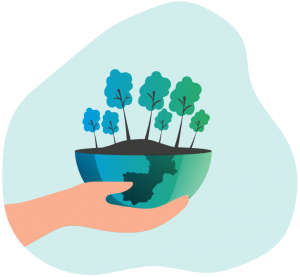
Biotechnology is a deeply transversal tool, which is presented as a key lever to promote innovation in multiple sectors linked to the economy, such as agri-food, environmental or marine, among others.
However, it is a relatively new sector, so from Bioga we are promoting a biohybridization plan, with which we are attracting to our sector large companies that see in biotechnology a way to develop new processes, services or products and provide existing ones with an added value that differentiates them from their competitors.
Many will continue to be struck by the fact that Galicia has an important role in biotechnology. There are very surprising figures such as that the annual global turnover is close to 400 million euros…
Galicia is positioning itself as a reference bioregion in biotechnology. This is not a coincidence, it is the result of the collaborative and synergistic work that all the agents of the ecosystem have been developing during the last years.
Proof of this growth is the evolution of the Cluster, which was founded in 2010 with 3 partner entities and currently around one hundred associates.
It is also worth highlighting the role played by public-private collaboration and, specifically, the implementation of the Strategy to Promote Biotechnology implemented in 2016 by the Galician Innovation Agency in collaboration with Bioga. This strategy, a pioneer in Spain, laid the foundations for articulating a roadmap for the sector and, recently, has had its continuity in the Consolidation Strategy, which will mobilize between 2021 and 2025, 662 million euros.
In which sector or sectors are you currently working the most?
As part of the development process of the Biotechnology Consolidation Strategy 2021-2025, a series of subsectors have been defined and prioritized that will be strategic for Galicia during the coming years.
These are the production and use of agriculture and livestock; functional food and nutraceuticals for health and active ageing; new technologies for personalized medicine; the development and production of drugs and vaccines; and the environment, circular economy and bioenergy.
These subsectors have been prioritized based on the opportunity they represent for Galicia, their scientific-technological capacity and the relative weight they represent in the biotech ecosystem.
Are there any important projects in hand in 2022?
If I had to highlight 2 important initiatives and challenges during this year, it would be the retention and attraction of talent and access to financing.
Focused on the talent challenge, we have launched the Biotalent Program, an ambitious action plan that aims to connect job supply and demand and implement mechanisms for the retention and attraction of specialized talent, both technical and management and business development.
With regard to access to financing, it is important to put in place mechanisms that help companies to attract resources and financing that allow their growth and consolidation. In this sense, we are working with 20 projects/companies through the IX edition of the Bio Investor Program, an activity that aims to promote access to private financing for projects and companies in the Galician biotechnology sector through a training and mentoring program.
Innovation is vital to being competitive. Do we understand this here, in Galicia?
I think that Galicia is a land of innovators and entrepreneurs in which, with few resources, we have always done great things. In the biotech sector, innovation is implicit in our DNA and, as I said, we can help other sectors of our economy innovate.
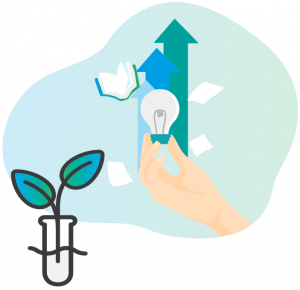
To achieve internationalization it is vital to bet on this innovation. You who have a privileged view of what is happening outside our borders, is Galicia doing its homework? Are we competitive?
Biotechnology companies are born with a clear international vocation, since usually a large part of their clients are abroad.
In Galicia we have leading international companies such as CEAMSA, the largest producer of carrageenan in the world, or Mestrelab Research, which has a presence in multiple countries such as China, Japan, the United States or India. We also have headquarters of large multinationals such as Lonza, which has a plant in Porriño specialized in recombinant proteins and monoclonal antibodies.
From the Cluster we have opted to strengthen our international area with the organization of various trade missions and grouped participation in sectoral fairs, in addition to establishing new contacts and collaborations with bioregions of international reference.
Are the objectives set in the Strategy for the Consolidation of Biotechnology of Galicia 2021-2025 being met?
We continue the path of good results achieved in the previous period and our sector continues to grow at a rate of 10% per year in terms of turnover, employment and entrepreneurship, so we are sure that we will once again achieve the ambitious objectives we have set.
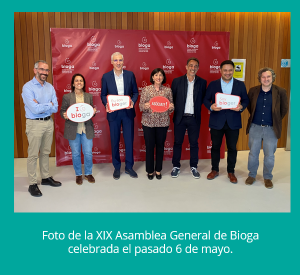
Finally, having Bioga in DATAlife is a luxury, you are an essential piece for us. We would like to know what motivated you to get on our boat and what you expect from us. How can we help?
What motivated Bioga to promote DATAlife was the very need for digitalization suffered by SMEs in the biotechnology sector. We were clear that it was necessary to take the step of founding and creating the Hub and not miss the opportunity to offer companies solutions to improve their digital processes.
From DATAlife we expect the complementarity that IHL can offer us in digital matters. From Bioga we have identified the need for digitalization, but we need a specialized agent to help us both in the diagnosis, in the design, as well as in the implementation of these solutions, and that is where DATAlife plays an important role. From creating digital culture to raising European funds through innovative projects are points that add value from the Hub to Bioga and that provide a solution to each biotech SME, regardless of their state or digital maturity.
